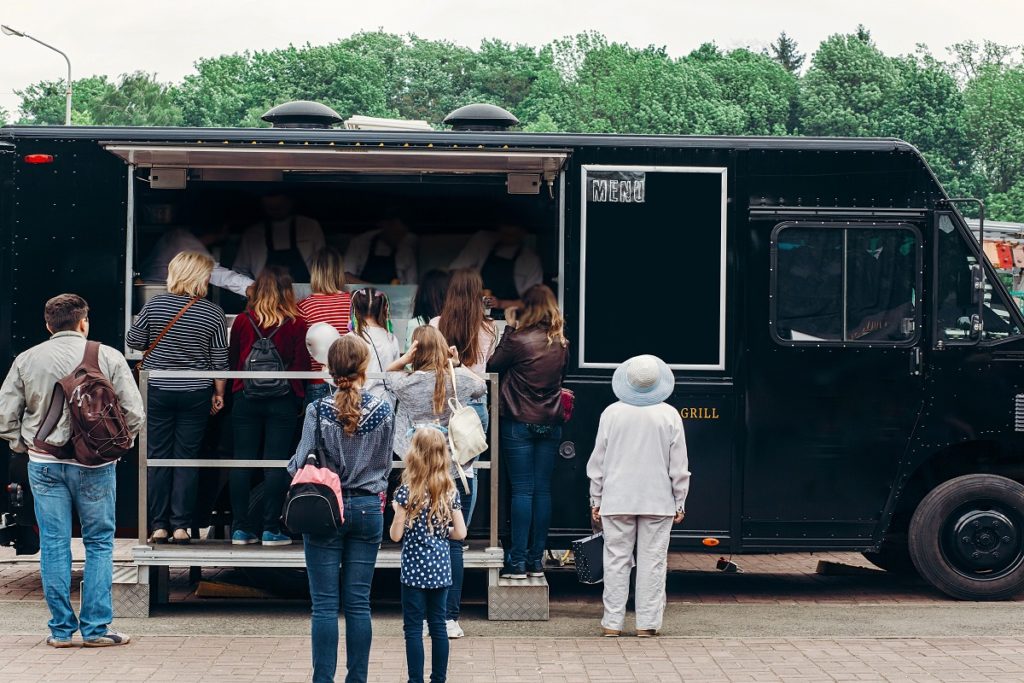Last May, Roaming Hunger CEO Ross Resnick suggested food trucks as an option to satisfy the public’s desire to eat out during the pandemic. Indeed, food trucks allow people to keep their distance while waiting in line, and or order online via mobile apps. Considering that social distancing protocols are still in place, food trucks really do seem like a more feasible food business idea than a restaurant. After all, the future of the restaurant industry remains uncertain.
During the first 22 days of March 2020 alone, the restaurant industry has lost $25 billion in revenue. It plummeted even deeper in April, hitting $80 billion. Thankfully, the COVID-19 vaccines are now available, slowly shedding backlight on the dark days of the restaurant industry. Still, the pandemic has proven that restaurants can easily decline during a health crisis.
Food trucks, on the other hand, have a more solid hedge against health crises. People can now download food truck apps so that they can pre-order their meals, and either pick up their order from the nearest food truck or have the food truck come to their place. Though many restaurants also offer the same services, food truck meals are usually cheaper, making them a more attractive option.
But now that we’re slowly seeing the end of this pandemic, will food trucks still be a booming business in 2021?
Why Start a Food Truck Business
Pandemic aside, food trucks allow entrepreneurs to run a profitable food business without paying expensive rent, equipment, and other operating costs. For that same reason, it’s easier to start a business. After securing all the necessary permits, just select among a range of mobile equipment suppliers, such as Lakeside Manufacturing and other well-known companies, and you’re all set to go up and running.
With a food truck, you may also expand your reach to an area where demand is rather high. For instance, hospitals, office buildings, or outside sports or concert venues. Residential communities are a promising market too; the pandemic has increased the demand for food to be brought into communities. Hence, you may work with property managers or a homeowner’s association for your food truck to be placed in a residential complex.
Food Truck Business Performance During COVID-19

Food trucks weren’t spared from the effects of COVID-19. Since their major sources of revenue, namely festivals, sporting events, and concerts, were canceled, food trucks also suffered a decline in revenue. They also lost their everyday customers, who were the pedestrians and office workers.
But food truck business owners used their wits and catered to people holed up in their homes. Simply put, they went into neighborhoods through the ways stated above. Some also offer online ordering and curbside pickup, and delivery services.
Some food trucks also struck deals with essential businesses to let them park in their lots. This is how you’d cater to health workers and essential employees. If you’re in a more rural or secluded area, where delivery trucks dominate the streets, you may station your food truck in a rest stop, so that drivers can buy a snack from you.
Because food trucks enjoyed these amazing opportunities, they hardly suffered the impact of COVID-19. They were able to instill a sense of normalcy in people who missed dining out, and because of that, their customers can have them on their radar when the restrictions ease. They may call them again to book a catering service, or to book their entire food truck for a major event.
Best Cities For a Food Truck Business
It turns out that not all cities are ideal for a food truck business. According to the 2018 “Food Truck Index”, the food-truck-friendliest cities are Portland, Denver, Philadelphia, Austin, Los Angeles, and Nashville. Orlando, Indianapolis, and Houston also made it to the list.
The worst cities for a food truck business, on the other hand, are San Francisco, Washington D.C., Boston, and Seattle. The index covered three criteria, namely obtaining permits and licenses, complying with restrictions, and operating a food truck. Considering that the “worst” cities are the highly-regulated ones, it’s not surprising why food trucks don’t thrive in them.
Therefore, even if it’s an excellent idea to start a food truck business now, don’t disregard the importance of the right location. Just because you’re mobile doesn’t mean that your location won’t play a part in your success.
Consider this is your calling to start a food truck business if you’ve been contemplating whether to do it or not. People will likely stay wary of eating in restaurants for the better part of 2021, so capitalize on this behavior and provide them comfort with your tasty meals.
